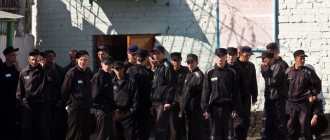Colony settlement. Is it possible to use a mobile phone in a colony settlement?
Is it possible to use a mobile phone in a colony settlement?
Answers to the question:
According to internal regulations, usually no. Article 129. Conditions for serving imprisonment in colony settlements
[Criminal Executive Code of the Russian Federation] [Chapter 16] [Article 129]
1. In colony settlements, those sentenced to imprisonment:
a) are kept without security, but under the supervision of the administration of the colony-settlement; during the hours from getting up to lights out, they have the right to free movement within the colony-settlement; with the permission of the administration of the colony-settlement, they can move without supervision outside the colony-settlement, but within the boundaries of the municipal entity on the territory of which the colony-settlement is located, if this is necessary due to the nature of the work they perform or in connection with training; may wear civilian clothes; may carry money and valuables; use money without restrictions; receive parcels, packages and packages; may have dates without limiting their number;
b) live, as a rule, in dormitories specially designed for them. Convicts who do not commit violations of the established procedure for serving their sentence and who have families, by order of the head of the colony-settlement, may be allowed to live with their families in rented or their own living space located within the boundaries of the colony-settlement or the municipality on the territory of which the colony-settlement is located . These convicts are required to appear for registration in the colony-settlement up to four times a month. The frequency of registration is established by a resolution of the head of the colony-settlement. The residential premises in which convicts live can be visited at any time by a representative of the administration of the colony settlement;
2. Convicts are prohibited from using and storing on the territory of the colony-settlement and at facilities where work is carried out, objects and substances, the list of which is established by the Internal Regulations of Correctional Institutions.
Attention! Reply from a user who is not registered as a lawyer.
Those. if the Colony is located on the outskirts of the city, but the territory belongs to the city, does that mean I can live at home in this city?
Source
How mobile phones end up in prison
Despite the fact that there is a strict ban on the use of mobile phones in prisons, prisoners still have access to cellular communications. One of the reasons why the ban becomes available to prisoners is the carrying of phones by the correctional facility staff themselves.
If the convicts are unable to reach an agreement with the inspector, then various tricks and tricks are used. You can smuggle your phone in by hiding it in the sole of your shoe, bread, or soap. Prisoners even manage to hide the device inside themselves by inserting it into their anus. For such tricks, small push-button phones are often used.
A phone can also get into the zone by being transferred from outside, or with a parcel from relatives. However, the transferred items and products are carefully inspected before they fall into the hands of the prisoner, which significantly reduces the chances of being banned from the colony.
If the convicted person ends up with the phone, he will definitely hide it in a safe place. Skirting boards, potholes in the wall or floor, under tiles and many other “secluded places” are ideal for this. Nevertheless, during searches, employees of the institution manage to find so-called “hiding places” with a ban, but for now, we can say that as many phones are confiscated, the same number of them appear again.
Similar questions
Do colony settlements currently exist? I heard from some lawyers that now there are no colony settlements, although the prosecutor in the north-west. asked to appoint a colony-settlement. Is it true that colony settlements were abolished?
Is it possible to use a mobile phone in a penal colony?
Is it possible to use a mobile phone in a colony settlement?
Is it possible to use a mobile phone in a penal colony?
Is it possible to use a mobile phone in a colony settlement? And how do they give weekends home?
Is it possible for a convict to use a cell phone outside the territory of a colony-settlement and should a convict in a colony-settlement each time ask permission to talk on a payphone, and can the administration in a colony-settlement limit the time everyone has access to the phone, for example: in the morning from 11 to 12 o'clock and in the evening from 17 to 18 hours.
Colony settlement. Now my husband has been transferred from a strict regime to a settlement colony,
Source
Severe punishment or holiday camp? Colonial settlements - what are they and how do they live there?
KP - what is it? In the early 60s, correctional labor colonies and settlements appeared in the USSR, where convicts live and work in conditions close to free life.
The point of such institutions is that people convicted for the first time and for minor crimes can undergo correction under the supervision of special services, but without complete isolation from society. In the article we will look in detail at how they sit in a checkpoint - is it easy for convicts to live there, what are the conditions and features of the regime.
Conditions of serving
What is the institution like and how do they serve their sentences here? A colony-settlement looks little like a prison: movement around the territory is free, there are no guards or towers, and there are no high walls with barbed wire. The colony is run by an administration that enforces the rules and organizes the work of the settlers.
According to Art. 128 of the Penal Code of the Russian Federation, the following are sent to colony settlements :
After the verdict is passed, the territorial body of the Federal Penitentiary Service is obliged:
You will find more information about what a colony-settlement is in this material.
Under what conditions are sentences served in a penal colony?
Externally, the colony settlement does not look like a prison. Settlers serving time can freely move around the territory. The colony itself is not fenced with a high wall with barbed wire. Life, work and compliance with the rules are controlled by the administration.
The categories of criminals who can serve their sentences in a free settlement are defined in Article 128 of the Penal Code of the Russian Federation:
- citizens who committed a crime through negligence, regardless of whether they served a sentence of imprisonment or not;
- citizens who were convicted for the first time for committing intentional crimes of minor or moderate gravity;
- convicts with good characteristics who are transferred from general and strict regime colonies.
The convict will have to get to the free settlement on his own. If he lived or was convicted in a certain region, then he must serve his sentence in accordance with the rules in that region. After the verdict has been passed, the Federal Penitentiary Service is obliged to:
- issue an order to be sent to a penal colony where the sentence will be served;
- pay for travel to the settlement and provide food for the duration of the journey;
- create a case file for the convicted person (fill out a form, take fingerprints);
- determine and announce the period during which the convicted person must arrive at the place of serving the sentence.
Conditions of detention
Convicts live in dormitories with several people per room. Living conditions can vary greatly depending on the colony , usually the rooms have: beds on a metal frame with a mattress, a personal bedside table for each resident, a wardrobe for outerwear, a desk, chairs, a cabinet or shelves for food, a mirror, lamps, etc. It is possible to have a TV and a refrigerator. As a rule, settlers visit the bathhouse once a week.
On the territory of the colony there must be:
What are they?
Two types of colony-settlements are envisaged:
Read about how and where minors usually serve their sentences in Russia here.
Schedule
The daily routine depends on the internal regulations adopted in a particular colony . As a rule, it looks like this:
Studying in educational institutions takes place according to a special schedule.
Nutrition
Each colony has a canteen, but the food served there leaves much to be desired. As a rule, these are porridges and soups made from cereals and substances resembling “compound fat”, which are classified as products of animal origin.
In the store you can buy your own products , such as: canned meat and fish, pickles (cucumbers and tomatoes), mixed vegetables, dairy products, cereals, pasta and instant noodles.
An important place in the diet consists of products received through transmission from relatives.
More information about the nutrition of prisoners in the MLS can be found here.
Job
Colonies can be located near populated areas or right in the city. But more often they are found in the dense forests of the north and east of Russia.
In colonies remote from civilization, the choice of work is small : logging and woodworking are hard and dangerous work in unfavorable climatic conditions. It also happens that in such colonies there are much fewer jobs than there are colonists themselves, and in this case, work is a privilege that allows you to have a modest income and after some time count on parole.
In and around cities, work often involves tailoring. Also, with the permission of the administration, you can get a job in a locality nearby. It is unlikely that a convicted person will agree to be hired for a highly paid job, but this could be, for example, work in a factory, in the housing and communal services sector, in the agricultural sector or in the service sector. Since the uniform in the colony-settlement is loose, those around you may not understand that they are working together with the convict or receiving some kind of service from him.
Prisoners' labor rights are often violated:
Convicts are afraid to defend their rights, because otherwise they will face penalties, including a punishment cell: it is enough to “receive two punishment cells” for the colony administration to have grounds for transferring the convict to a general regime colony or denying him parole. It is very difficult to defeat the colony administration in court , and weighing all the risks, the majority of convicts prefer to put up with the violation of their rights.
Studies
According to paragraph 4 of Article 129 of the Penal Code of the Russian Federation, a convicted person has the right to receive secondary vocational and higher education, the form of education is correspondence. You can only enroll in educational institutions located in the same municipality as the colony.
Education is a good basis for incentives and subsequent parole , and the education received will be useful after release.
Entertainment and relaxation
In accordance with labor legislation, convicts are guaranteed an 8-hour working day and two days off, but these standards are often not respected, and colony residents do not have much free time.
Settlers have different options for spending their leisure time:
Religion
The colonies are periodically visited by priests, and some even have chapels built ; in regions with a Muslim population, mosques can be found in the colonies. But problems may arise with performing namaz: although, according to the law, the colony administration does not have the right to interfere with religious rituals, in practice, strict adherence to the generally accepted regime is more important for the administration.
Dates and visits
Visits are an important part of a prisoner's life to maintain morale.
There is no limit on the number of dates only in KP. You can find out how short-term visits are conducted in institutions with other regimes in this article, and here we talked about the conditions for obtaining and holding long-term meetings with prisoners.
Transfer of products and things
Residents of the colony have the right to receive parcels and money transfers in any quantity.
You will find more information about the rules for transfers to convicted persons in the MLS in a separate article.
Is it possible to wear long hair?
Women have the right to wear long hair , but many cut their hair short for convenience. It is not customary for men to wear long hair, although formal prohibitions or permissions depend on the internal regulations of the colony.
Using a mobile phone
Mobile phones are prohibited in all correctional institutions of the Russian Federation, which, however, does not prevent convicts from using them everywhere.
The severity of the ban depends on the policy of the administration , which in turn is caught between two fires: on the one hand, the storage and use of mobile phones is directly prohibited by law, on the other hand, if this ban is defended too harshly, convicts may begin to rebel, sabotage work and engage in sabotage.
As a rule, the administration builds a compromise policy in which periodic searches and seizures of mobile phones take place, but this does not happen very diligently and often, so settlers have the opportunity to use mobile phones, storing them in hiding places on the territory of the colony. Often the guards themselves are engaged in selling phones several times more than their retail price.
Is it possible to go home for the weekend?
The law states that convicts can leave the territory of the colony only “if it is necessary due to the nature of the work they perform or in connection with their studies,” that is, formally it is impossible to go home on the weekend . However, in many colonies it is possible to go home for the weekend if you have a good and trusting relationship with the leadership or for a certain amount of money.
At the same time, the law also states: “Convicts who do not commit violations of the established procedure for serving a sentence and who have families, by order of the head of the colony-settlement, may be allowed to live with their families in a rented or their own living space located within the boundaries of the colony-settlement or municipal entity , on whose territory the colony-settlement is located.”
Are hours allowed?
In a settlement colony it is allowed to wear a wristwatch, but in prisons and pre-trial detention centers - not.
Living conditions of convicts in a free settlement
Persons who have broken the law live in dormitories, several people per room. Living conditions depend very much on the colony. As a rule, the rooms have a bed and a personal bedside table for each resident, wardrobes, a desk and shelves (racks) for food, a mirror, and lamps. Sometimes the rooms have a refrigerator and TV. Once a week prisoners visit the bathhouse.
On the territory of the colony-settlement there should be:
- medical hospital;
- shop;
- bath;
- school, library, assembly hall;
- separate rooms for receiving guests (sometimes small hotels).
Types of free settlements
There are two types of settlement colonies:
- For those who committed a crime through negligence and received a sentence of up to 5 years in prison.
- For prisoners with positive characteristics who have been transferred from other correctional institutions.
In addition, free settlements can be strictly female or strictly male, mixed and intended for juvenile offenders.
Schedule
The daily routine may differ slightly in different settlements and depends on internal regulations. Most often, a prisoner’s day consists of the following stages:
- getting up around 5-6 am, exercise – 15 minutes, toilet and filling the beds – another 15 minutes.
- morning check (lasts up to 40 minutes);
- breakfast (half an hour is allotted);
- travel to the place of work and distribution of instructions – up to 1 hour;
- working hours - a shift lasts 8 hours (quite often the Labor Code is violated, and a shift can last 10-14 hours);
- lunch break (half an hour);
- returning from work – about 30 minutes;
- dinner (half an hour is allotted);
- educational activities – up to 1 hour;
- personal free time – about an hour;
- preparation for bed – 15 minutes and sleep – 8 hours.
Those prisoners who are admitted to study have a special schedule.
Have a question for a lawyer? Ask now, call and get a free consultation from leading lawyers in your city. We will answer your questions quickly and try to help with your specific case.
Telephone in Moscow and the Moscow region: +7
Phone in St. Petersburg and Leningrad region: +7
Free hotline throughout Russia: 8 (800) 301-39-20
What do they eat in the colonies?
Each free settlement has its own dining room. But the dishes prepared there do not differ in either taste or nutritional value. As a rule, these are soups and porridges made from cereals and special substances that are classified as products of animal origin.
There is also a store on the territory of the colony where you can buy canned meat and fish, mixed vegetables, instant noodles, pickles, dairy products, cereals and pasta. Some dormitories have kitchens where prisoners can cook for themselves.
Depending on the internal regulations of the settlement, convicts may be allowed to have their own dishes (pots, pans) and stoves for cooking. A special place in the diet is made up of products that prisoners receive from their relatives.
Employment
Free settlements can be located within populated areas or right in the city. But, as a rule, they are found in forests in the north and east of the Russian Federation. In such colonies there is little choice of work. Most often, prisoners can only work in logging and woodworking - dangerous and hard work in difficult climatic conditions.
There are also cases when there are many more prisoners than jobs. In such settlements, employment is a privilege that allows you to count on a small salary and parole.
In those settlements that are located near cities, prisoners may be offered work in tailoring. If the administration gives permission, you can get a job in the locality itself or nearby. Of course, prisoners cannot count on employment with high wages, but they can be hired in the agricultural sector, in the service sector, or in factories.
Very often the labor rights of convicts are violated:
- work shift is 12 hours;
- prisoners have low wages, from which they can additionally withdraw funds to pay for food and other services;
- prisoners are forced to agree to free work to improve the territory of the settlement.
Prisoners are afraid to stand up for their rights, since they can be sent to a punishment cell for active protests. For two violations, the administration can deny parole or transfer the prisoner to a general regime colony.
Education
Article 129 of the Penal Code of the Russian Federation regulates the right of a prisoner in a colony-settlement to receive higher or secondary specialized education through correspondence courses. You can only enroll in an educational institution that is located in the same municipality as the colony.
Leisure and recreation
Prisoners do not always have the opportunity to spend their leisure time due to violations of working conditions. But if it appears, then in their free time the prisoners can:
- visit a library, assembly hall, cinema or a special lounge with a TV;
- play various games, for example, backgammon (and even card games, although formally they are prohibited);
- if the prisoner maintains good relations with the administration, then he may be released for a walk in the nearest town.
On holidays, free settlements usually host feasts. They cook from products bought in the store, or put on the table what came in parcels from relatives.
Religion
Priests periodically come to free settlements. Small chapels were built on the territory of some colonies. In regions with a Muslim population, mosques can be found in such settlements.
Visits from relatives and dates
Visits or visits from relatives are very important to maintain the morale of the prisoner. Only in the colonies there are no restrictions on the number of dates. They take place in specially equipped rooms. Some settlements have small hotels.
Parcel delivery
Prisoners have the right to receive food, personal belongings, and money transfers in any quantity. The main thing is that the contents of the parcels do not violate the established list of permitted items.
Is it allowed to wear long hair?
Women can wear their hair to any length, but most often it is cut short for convenience. There are no formal restrictions among men, but among prisoners it is not customary to wear long hair.
Using a mobile phone
The internal regulations of the colonies, as well as at the legislative level, strictly prohibit the use of mobile phones. However, almost every prisoner has one.
The severity of the ban depends on the administration's policy. But quite often they turn a blind eye to this violation, since it becomes clear that if the use of mobile phones is completely limited, then prisoners can rebel, sabotage work, and engage in sabotage.
Are they allowed to go home on weekends?
Technically, you can't go home for the weekend. The law states that a person can leave the colony only if necessary for work or study. However, in many colonies, the administration releases prisoners who maintain good relations with the management on weekends for a certain amount of money.
Also in the law there is a certain condition regarding the residence of the convicted person with his family. It states that, at the discretion of the head of the colony, a convicted person may be allowed to live with his family in his own or rented living space, if it is located within the boundaries of the colony or municipality.
Can I wear a wristwatch?
In a free settlement, it is allowed to wear a wristwatch, unlike prisons and pre-trial detention centers. This rule applies to all institutions located on the territory of the Russian Federation.
Severe punishment or holiday camp?
Sentence to a penal colony is a relatively mild form of punishment available in Russian legislation. However, living conditions very much depend on the policies of a particular administration.
As a rule, prison inmates strive to be transferred to a colony-settlement, but it also happens that in some colonies such unbearable living conditions have been created that settlers are willing to deliberately violate the rules of the colony and even commit crimes in order to be transferred to other correctional institutions.
Rules for providing convicts with telephone or video conversations
One of the most terrible tests for convicts is separation from family and friends, as well as deprivation of the usual means of communication. Sometimes you have to forget about long conversations in instant messengers and social networks, video calls and other delights of civilization for many years.
Official Statements and Explanations
There is still a possibility for convicts to communicate with their relatives and friends, and it is spelled out in the same above-mentioned Internal Rules of the Penitentiary Commission. According to them, every convicted person has the right to a telephone conversation lasting no more than 15 minutes. If technical capabilities are available, video communication can also be provided. However, the number of permitted telephone and video conversations is not specified anywhere and is therefore unlimited .
To obtain permission to negotiate , you must submit a written application addressed to the head of the colony (IO or a person replacing him). It must indicate:
As a rule, a separate room is allocated for a “negotiation point”, and the right to negotiate is exercised during non-working hours.
Telephone calls can be paid for by the convicted person himself or by the subscriber (at his request). Convicts are still allowed to have telephone cards, but they must be kept by the administration representative on duty (the cards are signed and issued if there is permission to speak).
While the convict is in the colony, you will have to forget about the confidentiality of negotiations: the correctional officer has every right not only to be present at the communication session, but also to control its progress.
If the application specifies a language other than Russian, a translator is usually invited. There is no need to pay for his services (the state pays for it), but how quickly they will find an expert in the relevant language is unknown. Therefore, the majority of convicts prefer to communicate, albeit in broken, Russian (if the subscriber knows it, of course).
As a rule, upon arrival at the correctional facility, all convicts are allowed to contact their relatives (with the exception of regime violators during the detention period). However, violators and people held in cells (punishment isolation cells, PKT, EPKT) for other reasons, who under normal circumstances are deprived of the right to telephone communication, in exceptional cases can talk with their relatives.
It is allowed to communicate even with relatives staying in another colony. But God forbid that these “exceptional circumstances” should occur! Can the conversation be interrupted?
If you communicate on ordinary topics in Russian, the colony officer is unlikely to interrupt the conversation. The Rules clearly state the cases when a telephone conversation can be interrupted before the stated period has expired:
Please note that violating the rules of telephone conversations may lead to unpleasant consequences, for example, a tightening of the prisoner’s detention regime.
Incentives may be applied to convicted persons for good behavior (RF Penal Code Article 71):
Source
Mobile freedom: is it easy for convicts to get a phone in a colony?
Every month we detain 3-4 people trying to deliver a phone. These are relatives who come for long visits. Although they understand the responsibility, this does not stop them. Most often, girls and wives and parents approach this more cautiously and still put the convicts on the path to reform. If we talk about the convicts themselves, then every month employees of the operational department detain them while trying to deliver them - at the fence.
— What punishment does the convicted person face for organizing the delivery?
Vladimir Palenov: “We seize about 100-150 devices every year” Photo: Inga KNIZHKINA - Very active. Can a settlement be transferred from a colony to a prison? As soon as we discover that a person is on a social network, he is placed under enhanced surveillance; all departments and services work on him. All employees of departments and services, educators, psychologists, carry out educational work with him, explain the illegality of such behavior.
— How pressing is the problem of mobile phones in correctional institutions?
— There is order No. 72, which allows convicts to be placed on preventive registration. That is, these are persons who systematically violate. We register them and work with them. There are now about 200 such people.
— Every month we detain 3-4 people trying to deliver a phone. These are relatives who come for long visits.
Although they understand the responsibility, this does not stop them. Most often, girls and wives and parents approach this more cautiously and still put the convicts on the path to reform. If we talk about the convicts themselves, then every month employees of the operational department detain them while trying to deliver them - at the fence. The attacker tried to deliver the phones using a bow; photo: Federal Penitentiary Service of Russia in the Vologda Region A man was detained twice this year; he used first a bow, then a crossbow to transfer. After the first time, they detained me and drew up a report on an administrative violation.
The man received a fine of 4 thousand rubles. The maximum penalty under this article is a fine of 5 thousand. But it does not pose a particular danger to citizens and convicts, because they promise a more substantial reward for delivery.
Penalty when device is detected
Cell phones are included in the list of prohibited things , and if a prisoner tries to circumvent the established rules and hide the phone, he will suffer disciplinary punishment in accordance with Art. 117 of the Penal Code of the Russian Federation (reprimand, transfer to a punishment cell or punishment cell). In addition, an inspection will be carried out to identify persons contributing to the appearance of prohibited things in restricted areas.
Punishment for both parties if the fact of transfer of the phone is discovered. If the pre-trial detention center staff notice that a visitor secretly gave or attempted to give a cell phone to a prisoner, the meeting will be immediately stopped and the cell phone will be confiscated (read more about how to get a date in a pre-trial detention center and really help a person here, and in more detail about Find out how to correctly write an application for a visit to a pre-trial detention center in this material). The punishment is stated in Article 19.12 of the Code of Administrative Offenses of the Russian Federation - an administrative fine in the amount of three thousand to five thousand rubles will be imposed on the visitor.
Is it allowed to call your relatives in a colony settlement?
Is it possible to somehow contact a person serving a sentence in a penal colony? My husband didn’t call back upon arrival and disappeared from the network as he was approaching the city. I really want to know if everything is okay with him and maybe he needs something
A telephone conversation, if technically possible, is provided by the head of the correctional institution, the person replacing him, or the person responsible for the correctional institution on weekends and holidays, upon a written application from the convicted person (clause 85 of Order of the Ministry of Justice of Russia dated December 16, 2016 No. 295)
The procedure for telephone conversations of persons sentenced to imprisonment is regulated by Art. 92 of the Criminal Executive Code of the Russian Federation and Order of the Ministry of Justice of Russia dated December 16, 2016 No. 295 “On approval of the internal regulations of correctional institutions. I recommend that you contact the administration of the correctional institution or the territorial department of the Federal Penitentiary Service. The use of cell phones in correctional facilities is prohibited. Is it possible to go home from the colony for the weekend? However, convicted persons have the right to telephone conversations in the manner prescribed by law. Those sentenced to imprisonment are given the right to telephone conversations. In the absence of technical capabilities, the administration of the correctional institution may limit the number of telephone conversations to six per year. The duration of each conversation should not exceed 15 minutes.
Telephone calls are paid for by convicted persons at their own expense or at the expense of their relatives or other persons (Article 92 of the Penal Code).
In touch with society: is there internet in prison and are phones allowed?
A search, or prison search, is carried out from one to several times a day. If a person serving a sentence is found to have a cell phone, it will be taken away.
Upon admission to the pre-trial detention center, the offender is subject to a search. During the search, the phone is taken away. They also take him away when he enters prison. In addition, in places of deprivation of liberty, prisoners are regularly searched.
Now do you know whether telephones are allowed in prison, and whether there is Internet in prison?
The Criminal Code prohibits all means of communication. They can also hide a cell phone in the anus . Before this, it is packaged, for example, in a condom. A criminal who finds himself in a pre-trial detention center with a cell phone can inform his accomplices about the progress of the investigation, confuse his tracks, and interfere with the investigation in other ways.
This is why cell phones are prohibited both in prisons and pre-trial detention centers.
How Russian prisons use the Internet and communications
Only 10% of all prisoners are women. Telephones are much less common in women's cells than in men's cells. After all, women are much more active in snitching on each other. Men, both free men and prisoners, very rarely start relationships with women behind bars. Ladies have nothing to gain from social networks and dating sites.
At the beginning of 2016, in a maximum security colony in the city of Rubtsovsk, Altai Territory, prisoners were allowed to regularly play games on X-Box consoles. Colony workers told reporters that each of the 260 prisoners is entitled to have fun in this way for 2 hours a week.
“Live, love, steal, walk, buy the whole world and then give it away! Always just remember one thing, don’t forget your lads!”
In 2014, in the Mozhaisk men's colony for minors, experimental training for the profession of “computer operator” was conducted. During the lessons, the boys learned how to use a mouse and keyboard, the basics of working with Windows, Word, Excel and Power Point.











